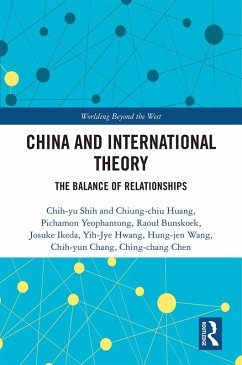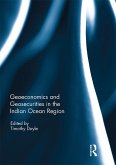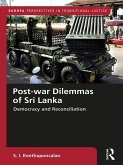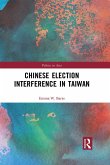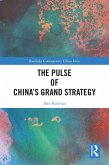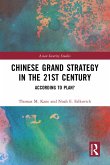43,95 €
43,95 €
inkl. MwSt.
Sofort per Download lieferbar

22 °P sammeln
43,95 €
Als Download kaufen

43,95 €
inkl. MwSt.
Sofort per Download lieferbar

22 °P sammeln
Jetzt verschenken
Alle Infos zum eBook verschenken
43,95 €
inkl. MwSt.
Sofort per Download lieferbar
Alle Infos zum eBook verschenken

22 °P sammeln
- Format: PDF
- Merkliste
- Auf die Merkliste
- Bewerten Bewerten
- Teilen
- Produkt teilen
- Produkterinnerung
- Produkterinnerung

Bitte loggen Sie sich zunächst in Ihr Kundenkonto ein oder registrieren Sie sich bei
bücher.de, um das eBook-Abo tolino select nutzen zu können.
Hier können Sie sich einloggen
Hier können Sie sich einloggen
Sie sind bereits eingeloggt. Klicken Sie auf 2. tolino select Abo, um fortzufahren.

Bitte loggen Sie sich zunächst in Ihr Kundenkonto ein oder registrieren Sie sich bei bücher.de, um das eBook-Abo tolino select nutzen zu können.
Major IR theories, which stress that actors will inevitably only seek to enhance their own interests, tend to contrive binaries of self and other and 'inside' and 'outside'. By contrast, this book recognizes the general need of all to relate, which they do through various imagined resemblances between them.
- Geräte: PC
- mit Kopierschutz
- eBook Hilfe
- Größe: 3.47MB
Andere Kunden interessierten sich auch für
![Routledge Handbook of Chinese and Eurasian International Relations (eBook, PDF) Routledge Handbook of Chinese and Eurasian International Relations (eBook, PDF)]() Routledge Handbook of Chinese and Eurasian International Relations (eBook, PDF)45,95 €
Routledge Handbook of Chinese and Eurasian International Relations (eBook, PDF)45,95 €![Geo-economics and Geo-securities in the Indian Ocean Region (eBook, PDF) Geo-economics and Geo-securities in the Indian Ocean Region (eBook, PDF)]() Geo-economics and Geo-securities in the Indian Ocean Region (eBook, PDF)45,95 €
Geo-economics and Geo-securities in the Indian Ocean Region (eBook, PDF)45,95 €![Post-war Dilemmas of Sri Lanka (eBook, PDF) Post-war Dilemmas of Sri Lanka (eBook, PDF)]() S. I. KeethaponcalanPost-war Dilemmas of Sri Lanka (eBook, PDF)46,95 €
S. I. KeethaponcalanPost-war Dilemmas of Sri Lanka (eBook, PDF)46,95 €![Chinese Election Interference in Taiwan (eBook, PDF) Chinese Election Interference in Taiwan (eBook, PDF)]() Edward BarssChinese Election Interference in Taiwan (eBook, PDF)43,95 €
Edward BarssChinese Election Interference in Taiwan (eBook, PDF)43,95 €![The Pulse of China's Grand Strategy (eBook, PDF) The Pulse of China's Grand Strategy (eBook, PDF)]() Jean KachigaThe Pulse of China's Grand Strategy (eBook, PDF)43,95 €
Jean KachigaThe Pulse of China's Grand Strategy (eBook, PDF)43,95 €![Space Warfare in the 21st Century (eBook, PDF) Space Warfare in the 21st Century (eBook, PDF)]() Joan Johnson-FreeseSpace Warfare in the 21st Century (eBook, PDF)37,95 €
Joan Johnson-FreeseSpace Warfare in the 21st Century (eBook, PDF)37,95 €![Chinese Grand Strategy in the 21st Century (eBook, PDF) Chinese Grand Strategy in the 21st Century (eBook, PDF)]() Thomas M. KaneChinese Grand Strategy in the 21st Century (eBook, PDF)41,95 €
Thomas M. KaneChinese Grand Strategy in the 21st Century (eBook, PDF)41,95 €-
-
-
Major IR theories, which stress that actors will inevitably only seek to enhance their own interests, tend to contrive binaries of self and other and 'inside' and 'outside'. By contrast, this book recognizes the general need of all to relate, which they do through various imagined resemblances between them.
Dieser Download kann aus rechtlichen Gründen nur mit Rechnungsadresse in A, B, BG, CY, CZ, D, DK, EW, E, FIN, F, GR, HR, H, IRL, I, LT, L, LR, M, NL, PL, P, R, S, SLO, SK ausgeliefert werden.
Produktdetails
- Produktdetails
- Verlag: Taylor & Francis eBooks
- Seitenzahl: 302
- Erscheinungstermin: 27. März 2019
- Englisch
- ISBN-13: 9780429751073
- Artikelnr.: 56837625
- Verlag: Taylor & Francis eBooks
- Seitenzahl: 302
- Erscheinungstermin: 27. März 2019
- Englisch
- ISBN-13: 9780429751073
- Artikelnr.: 56837625
- Herstellerkennzeichnung Die Herstellerinformationen sind derzeit nicht verfügbar.
Chih-yu Shih, the primary author of this book, teaches international relations theory, anthropology of Knowledge, and cultural studies as National Chair Professor and University Chair Professor at National Taiwan University. Access to his current research-Intellectual History of China and Chinese Studies-can be found at http://www.china-studies.taipei/ Together, his writings on IR theory, intellectual history, and ethnic citizenship challenge familiar social science and humanity categories. His co-authors-Chiung-chiu Huang (National Cheng-chi University), Pichamon Yeophantong (University of New South Wales, Canberra), Raoul Bunskoek (National Taiwan University), Josuke Ikeda (Toyama University), Yih Jye Hwang (Leiden University), Hung-jen Wang (National Cheng-Kung University), Chih-yun Chang (Shanghai Jiaotong University), and Ching-chang Chen (Ryukoku University)-have all published critically on Asia in IR in general and on China, Japan, Taiwan and ASEAN in specific. They have come cross each other through different joint projects involving critical IR, post-Western IR, homegrown IR, global IR, Asian IR and Chinese IR. Their careers include professional posts in India, Germany, Thailand, Japan, the US, Taiwan, the Netherlands, Australia, and China.
Chiung-chiu Huang is Associate Professor at the Graduate Institute of East Asian Studies, National Chengchi University, Taiwan.
Pichamon Yeophantong is an Australian Research Council DECRA Fellow and Senior Lecturer at the School of Humanities and Social Sciences, University of New South Wales at the Australian Defence Force Academy, Australia.
Raoul Bunskoek is a Ph. D candidate in the Department of Political Science at National Taiwan University, Taiwan.
Josuke Ikeda is Associate Professor at the Faculty of Human Development, University of Toyama, Japan.
Yih-Jye Hwang is Assistant Professor at the Faculty of Governance and Global Affairs, Leiden University College, The Netherlands.
Hung-jen Wang is Associate Professor at the Department of Political Science, National Cheng Kung University, Taiwan.
Chih-yun Chang is a Research Fellow at the Department of History, Shanghai Jiaotong University, China.
Ching-chang Chen is Associate Professor at the Department of Global Studies, Ryokoku University, Japan.
Chiung-chiu Huang is Associate Professor at the Graduate Institute of East Asian Studies, National Chengchi University, Taiwan.
Pichamon Yeophantong is an Australian Research Council DECRA Fellow and Senior Lecturer at the School of Humanities and Social Sciences, University of New South Wales at the Australian Defence Force Academy, Australia.
Raoul Bunskoek is a Ph. D candidate in the Department of Political Science at National Taiwan University, Taiwan.
Josuke Ikeda is Associate Professor at the Faculty of Human Development, University of Toyama, Japan.
Yih-Jye Hwang is Assistant Professor at the Faculty of Governance and Global Affairs, Leiden University College, The Netherlands.
Hung-jen Wang is Associate Professor at the Department of Political Science, National Cheng Kung University, Taiwan.
Chih-yun Chang is a Research Fellow at the Department of History, Shanghai Jiaotong University, China.
Ching-chang Chen is Associate Professor at the Department of Global Studies, Ryokoku University, Japan.
Introduction: Relating China to International Relations Part 1: Balance of
Relationships 1. Relationality versus Power Politics 2. Relational Policy
of Small States 3. Relational Policy of Major Powers Part 2: Philosophical
Resources 4. Relational Ontology 5. Buddhist State of Nature 6. Cyclical
View of History Part 3. Processes of BoR 7. Cultural Memory 8.
Psychological Efficacy 9. Institutional Style Part 4. Identities of the
Theory 10. Plausible Post-Western Theory 11. Plausible Chinese Theory 12.
Plausible Western Theory In Lieu of a Conclusion: Four Caveats
Relationships 1. Relationality versus Power Politics 2. Relational Policy
of Small States 3. Relational Policy of Major Powers Part 2: Philosophical
Resources 4. Relational Ontology 5. Buddhist State of Nature 6. Cyclical
View of History Part 3. Processes of BoR 7. Cultural Memory 8.
Psychological Efficacy 9. Institutional Style Part 4. Identities of the
Theory 10. Plausible Post-Western Theory 11. Plausible Chinese Theory 12.
Plausible Western Theory In Lieu of a Conclusion: Four Caveats
Introduction: Relating China to International Relations Part 1: Balance of
Relationships 1. Relationality versus Power Politics 2. Relational Policy
of Small States 3. Relational Policy of Major Powers Part 2: Philosophical
Resources 4. Relational Ontology 5. Buddhist State of Nature 6. Cyclical
View of History Part 3. Processes of BoR 7. Cultural Memory 8.
Psychological Efficacy 9. Institutional Style Part 4. Identities of the
Theory 10. Plausible Post-Western Theory 11. Plausible Chinese Theory 12.
Plausible Western Theory In Lieu of a Conclusion: Four Caveats
Relationships 1. Relationality versus Power Politics 2. Relational Policy
of Small States 3. Relational Policy of Major Powers Part 2: Philosophical
Resources 4. Relational Ontology 5. Buddhist State of Nature 6. Cyclical
View of History Part 3. Processes of BoR 7. Cultural Memory 8.
Psychological Efficacy 9. Institutional Style Part 4. Identities of the
Theory 10. Plausible Post-Western Theory 11. Plausible Chinese Theory 12.
Plausible Western Theory In Lieu of a Conclusion: Four Caveats
